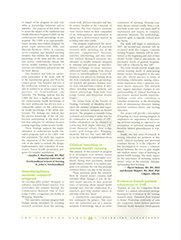30

Citation
Melrose, S. & Shapiro, B. (1996). Clinical teaching in mental health nursing. In What’s new in research … a cross-country sampling of recent initiatives and works in progress. The Canadian Nurse (92)10, 20.
The purpose of this research in progress is to investigate how student nurses develop personally meaningful constructs during their psychiatric mental health clinical rotation. A secondary purpose is to examine the role that personal construct theory can play in the process.
Three questions guide the research: How do student nurses construe staff activities? What changes, if any, do student nurses perceive in their personal ways of knowing about mental health nursing? And, does the construction of a repertory grid help student nurses to articulate what they learn?
A constructivist conceptual perspective undergirds the project. This view sees the individual not as a passive recipient of knowledge, but as an active constructor of meaning. Personal construct theory extends readily from a constructivist world view and lends itself to exploration and inquiry in complex, interactive situations. The methodology, repertory grids, is logically derived from the theory.
The study will begin in mid-January 1997. Six second-year students will be recruited from the Calgary Conjoint Nursing Program. Students will be interviewed at the beginning and end of their mental health clinical placements on psychiatric wards of general hospitals. Data will be collected by May 1997.
The study should provide insight into current learning needs of participating student nurses. Investigation in this area may also inform practice in terms of developing collaborative nursing educational experiences from a personal construct theory approach. The research may suggest important changes in our understanding of clinical teaching in psychiatric mental health rotations. Findings Could also contribute a Canadian perspective to the developing body of international literature linking personal construct theory and nursing education.
The project will provide a description of learning in a local nursing program. It emphasizes the importance of discovering personal meaning as opposed to an assumption of universal meaning, and therefore limited generalization is warranted.
Finally, two key areas of research in nursing education are pertinent to this study: clinical teaching and personal construct theory. It is the objective of this investigation to weave a common thread between the two to gain insight into student nurses’ ways of knowing in mental health nursing. The study argues for the importance of including student nurses’ voices in the scholarly dialogue surrounding their learning.
